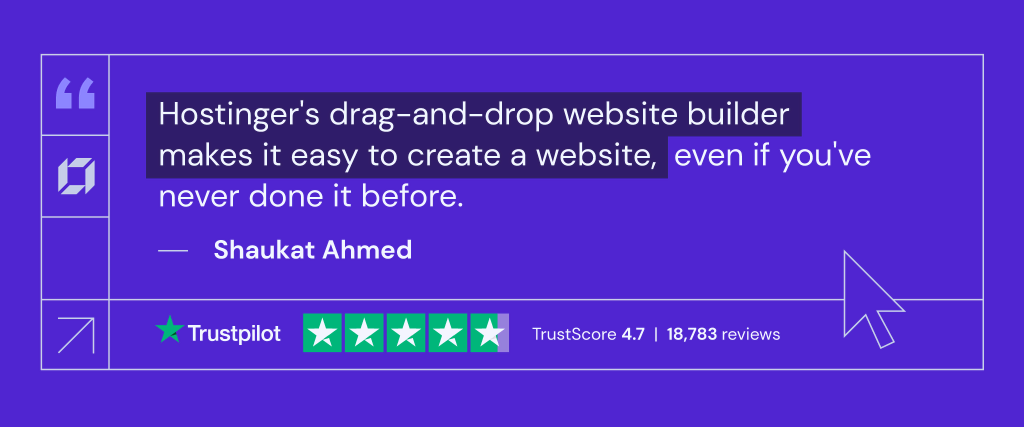Creating a Website Using a Website Builder vs Web Developer: Which One Is Better
After deciding that you need a website, the next step is determining how to create it. Usually, people who don’t code use a website builder or hire a web developer to streamline the web development process.
As each method has pros and cons, picking the one that best fits your needs and preferences is important. Some factors to consider include ease of use, cost, functionality, customization, maintenance, and scalability.
To help you choose, we’ll uncover the differences between using a website builder vs hiring a web developer to build your website.
First, let’s break down the concept of a website builder and a web developer, along with their advantages and disadvantages.
Download website launch checklist
Website Builder and Web Developer Overview
Before we compare website builder with website developer, let’s look at what each is and what their advantages and disadvantages are.
Website Builder
A web builder is a tool that enables you to create a website from scratch without any coding. Instead, it provides a drag-and-drop editor with a wide range of customization options.
Website builders come in online and offline versions. Despite needing an internet connection, online solutions are more popular than offline builders because they let you launch the site immediately after it’s done.
The best website builders include Hostinger Website Builder, Squarespace, and Shopify. Each platform has a different set of features for building niche websites. For instance, Hostinger Website Builder is great for designing online portfolios or even creating online stores.
Keep in mind that website builders differ from content management systems like WordPress.
Advantages and Disadvantages of Using a Web Builder
Some of the most popular reasons to use web builders include:
- Ease of use. Most website builders equip their features and tools with point-and-click functionality, making the platform user-friendly.
- Multiple design options. Pre-built templates make designing web pages easy and quick. If you want to make your own design without starting from scratch, you can customize the elements of an existing template.
- Affordability. Many web builders include web hosting services in their plans, saving you money and hassle from buying it from a third-party provider. Some builders, like Hostinger Website Builder, even add a business email address and a custom domain name.
- Third-party integrations. Connect your website with payment gateways, SEO tools, eCommerce platforms, and other services outside the website builder with a single click.
- Mobile compatibility. Most website builders provide mobile-friendly pre-built templates and an intuitive editor with a mobile preview feature. You don’t have to design two different templates to deliver an excellent user experience.
- Fully managed. Website builders automatically perform updates, implement security measures, and tackle other back-end-related responsibilities. By not self-managing your website, you can focus on producing content and improving its front-end functionality.
However, website builders have several disadvantages that deter people from using them:
- Limited customization. Despite having many design options, template customization options depend on the website builder’s built-in editor. Advanced customization usually requires custom code, which makes designing unique templates challenging.
- Limited scalability. Premium features and tools are generally available on high-tier plans. Once you’re on the most expensive plan, you must rely on add-ons to scale the website. Leveraging third-party tools is impossible unless the platform supports them.
- No ownership. Some website builders claim ownership over certain elements of their users’ websites.
- Ads. A site builder might display ads on websites running on its free and low-tier plans. Removing them requires upgrading to a higher-tier plan.
- Branding issue. You may have to pay extra to connect a custom domain name to your account. If you don’t upgrade, you’ll have to settle with the default subdomain and have your brand name attached to the web builder’s domain.
Web Developer
A website developer has the skills, knowledge, and experience to build a professional website.
Becoming a web developer requires learning web development and programming languages. You can learn to code on your own, get a formal education, or complete a web developer certification course.
Generally, there are three types of web developers ‒ front-end, back-end, and full-stack.
Front-end developers, together with web designers, focus on the site’s user interface, whereas back-end developers work on the website structure and systems. Both types of developers usually collaborate in a web development project to create a professional website.
Full-stack developers have the expertise to build a website’s client and server-side elements. As full-stack developers handle the responsibilities of both front-end and back-end developers, they can work alone on a web development project.
You can hire a web developer through freelance websites or web development companies.
Advantages and Disadvantages of Using a Web Developer
The advantages of hiring a web developer to build your website include:
- Custom work. You can request specific functions and build a custom website to suit your needs and preferences.
- Direct communication. You will be able to speak directly to the developer without explaining your issues to customer support agents unfamiliar with your situation.
- Optimization. Website developers know how to build an SEO-friendly website, increasing your site’s visibility on search engines. An optimized website also means better performance and user experience.
- Latest technology. Leverage website developers’ insights into the latest digital trends to build your website with the best practices and tools.
- Save time. Besides not having to build a site on your own, you will get periodic updates throughout the project timeline on your site’s progress.
- Consistent brand identity. Your website’s design elements will look consistent and align with your brand guidelines. Moreover, they will look unique ‒ leaving a strong impression on first-time visitors.
On the other hand, hiring a website developer has its downsides:
- Long search process. It might take time to find professional web designers and developers for your project.
- High starting rate. Since becoming a professional website developer requires significant time and money investment, hiring one might be costly. Your site’s type and complexity can also influence developers’ rates.
- Long completion period. As web developers have to code the site from scratch manually, they will take longer to complete the work than a typical website builder.
- Specific skill set. Most developers specialize in certain fields or coding languages. Depending on your needs, you may need to hire more than one developer. You can solve this issue by hiring a web development company instead, but doing so typically costs much more.
- Communication challenges. This issue is particularly apparent when working with overseas developers due to language barriers, cultural differences, and different time zones.
- Additional costs. Besides paying for website essentials like web hosting and a domain name, you must allocate a budget for revisions, plugin licenses, and maintenance.
Compare website builder to other ways of creating a website
Website Builder vs CMS
Website Builder vs Coding
Website Builder vs Web Hosting
Website Builder vs WordPress
Website Builder vs Custom Website
Website Builder vs Web Developer: Which Option Is Better
After learning about the pros and cons of using a website builder and hiring a developer, let’s compare them in several aspects of web development.
Web Developer vs Website Builder: Ease of Use
Most web builders promote ease of use as their main selling point. Their drag-and-drop editor allows users who don’t know coding languages to build websites quickly in a short period.
Despite this, a complete beginner to web development still has to learn the tools’ functions and all the technical jargon used throughout the platform.
The knowledge base and online tutorials might help overcome the learning curve, but navigating the website builder still takes time. Therefore, web builders are only easy to use for those who have basic web development knowledge.
On the other hand, developers are people you can talk to about your needs and preferences. They interpret your requirements into a web development plan and communicate with you throughout the website-building process in a simple way.
In that sense, hiring a website developer is easier than using a website builder.

Web Developer vs Website Builder: Cost
Website builders offer fixed pricing plans that users have to buy to unlock features and resources. The prices can be lower if you pay annually. Upgrading your plan increases the resource limit and gives you access to more and better tools.
The following are the price ranges when billed annually of several popular website builders, which already include hosting and a domain name:
- Squarespace ‒ $16-$49/month
- Shopify ‒ $19-$299/month
- Hostinger Website Builder ‒ $2.99/month
Meanwhile, web developers’ salary range depends on many factors, such as the country of residence, skills, and experience. For instance, the average salary for a web developer in the US is $46/hour. Countries with a fast-growing IT industry usually have higher salary ranges.
Web developers don’t cover the cost of web hosting and domain name registration, both influenced by various additional factors. The most cost-effective hosting type, shared hosting, costs around $1-15/month. Alternatively, host your website on a cloud server for $10-$200/month for better performance and security.
If your hosting plan doesn’t include a free custom domain, you must buy one from a domain registrar. The average cost for a domain name is around $10-$15/year.

As free builder plans and the inclusion of web hosting and a domain name reduce your website cost, site builders win this round.
If you want to create a website for your business, check out our guide comparing website-building costs for small businesses using the DIY approach and hiring professionals.
Web Developer vs Website Builder: Features and Scalability
Website builders offer pre-built features to accommodate different types of websites. However, they usually reserve premium features for users on higher-tier plans.
To illustrate, the following screenshot shows you won’t get any eCommerce features with the Squarespace Personal plan. With it, the best you can create is a basic website with few functions.
Many website builders also offer add-ons for third-party integrations on a subscription basis. While the integration process is usually straightforward and code-free, your ability to scale your website depends on the platform’s partnership with popular tools.
In comparison, web developers create websites from scratch. You can leverage their expertise to build a custom website with all the required features and integrated tools. As long as you hire the right developer, it’s possible to create your ideal website and scale it in the future without any restrictions.
In this case, hiring a web developer is a better web development solution than using a website builder, particularly if you want to build a complex site.
Web Developer vs Website Builder: Design and Customization
Website builders usually have a collection of pre-build templates for different website niches. The templates, available in free and premium versions, are modifiable using the platform’s page builder. Users who don’t have design or coding skills can use these templates to build beautiful websites in a short period.
Some website builders like Shopify and BigCommerce also accept templates built by third-party developers. You can buy them on online marketplaces like ThemeForest and CodeCanyon.
While using these templates is easier than coding from scratch, their designs are available for everyone. The more people use them, the less unique they become. Altering a complex template can also be challenging since advanced customization often requires custom code.
However, there are website builders with code editor features that enable you to make detailed changes to your website using custom code.
On the contrary, web designers create website templates from scratch based on your needs and preferences. They ensure your website has a unique look and consistent branding, improving its first impression.
The only downside is that web designers must collaborate with web developers to build a functional website, meaning more cost to you.
Web Developer vs Website Builder: Maintenance
Website builders automate software updates and maintenance for their users. This automation allows beginners without technical knowledge to manage their websites without risking breaking them due to misconfiguration. It also ensures your website always implements the latest security updates.
On the other hand, manually built websites require constant manual updates and maintenance. If you can’t perform them yourself, you must hire a web developer for ongoing support and maintenance. Not doing the procedure correctly can lead to fatal errors and higher website maintenance costs.
Website builders easily win this round with their straightforward maintenance solutions.
Conclusion
Whether you choose to use a website builder or hire a web developer to create your website, each option has its pros and cons. The best way to pick the best solution is to consider your needs, preferences, budget, and priorities.
Website builders are great for creating small to medium-sized websites quickly. They remove the hassle of manual coding, web design, and maintenance from the web development process. The fixed prices also make planning the budget for starting and scaling your website easier.
If you need a uniquely designed site with specific functionality, it’s best to hire website developers. This method may not be cost-effective, but it lets you leverage professionals’ expertise to build a custom website that fits your vision and optimize it for better performance.
We hope this article helped you decide how to best build your website. Good luck!
Suggested Reading for More Website Builder Comparisons
Website Builder vs Coding
Website Builder vs WordPress
Website Builder vs CMS
Hostinger Website Builder vs WordPress
Website Builder vs Web Developer FAQs
This section answers some of the most frequently asked questions about website builders vs web developers.
What Is the Difference Between a Web Developer vs Web Designer?
A web developer uses coding languages to build the website structure and functionality. Meanwhile, a web designer is responsible for creating the website’s look and feel. Usually, they collaborate to create a functional website in a web development project.
Can Web Developers Use Website Builders?
Yes, some developers specialize in certain website builders. Their services generally include website setup, personalized template design, and custom app development. Some website builders accept custom code, allowing developers to modify existing features’ configurations and integrate custom apps for additional functions.









Comments
May 19 2024
I want to create my own website
May 22 2024
That's great to hear! You can easily create your own website with Hostinger. Simply choose a hosting plan that suits your needs, and use our intuitive website builder or install WordPress for more customization options. If you need any assistance along the way, feel free to reach out to our Customer Success Team!